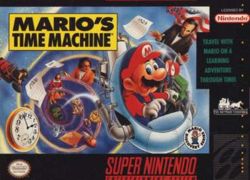Difference between revisions of "Mario's Time Machine"
(New page: {{Game | name=Mario's Time Machine | image=250px | bgcolor=silver | fgcolor=black | developer=Software Toolworks<br />Mindscape (SNES/US PC) | publisher=Sof...) |
m |
||
| (2 intermediate revisions by the same user not shown) | |||
| Line 7: | Line 7: | ||
| publisher=Software Toolworks<br />Radical Entertainment (NES) | | publisher=Software Toolworks<br />Radical Entertainment (NES) | ||
| system=PC<br />[[NES]]<br />[[Super Nintendo]] | | system=PC<br />[[NES]]<br />[[Super Nintendo]] | ||
| − | | release='''PC'''<br />EU 1993<br />US 1996 (Deluxe Version)'''Super Nintendo'''<br />December 1993<br />'''NES'''<br />April 23, 1994 | + | | release='''PC'''<br />EU 1993<br />US 1996 (Deluxe Version)<br />'''Super Nintendo'''<br />US December 1993<br />'''NES'''<br />April 23, 1994 |
| gallery= | | gallery= | ||
| genre= Edutainment | | genre= Edutainment | ||
| Line 13: | Line 13: | ||
|}} | |}} | ||
| − | '''Mario's Time Machine''' is an edutainment game that was developed for the PC and Super Nintendo, and later released on the NES. Due to being a licensed game with minimal involvement from [[Nintendo]], it is usually considered non-canon like its predecessor, ''[[Mario is Missing!]]'' | + | '''Mario's Time Machine''' is an edutainment game that was developed for the PC and Super Nintendo, and later released on the NES. It was only released in America and Europe. Due to being a licensed game with minimal involvement from [[Nintendo]], it is usually considered non-canon like its predecessor, ''[[Mario is Missing!]]'' |
=Story= | =Story= | ||
Latest revision as of 13:54, 14 July 2009

| |
| Mario's Time Machine | |
| Developer | Software Toolworks Mindscape (SNES/US PC) |
| Publisher | Software Toolworks Radical Entertainment (NES) |
| System | PC NES Super Nintendo |
| Release Date | PC EU 1993 US 1996 (Deluxe Version) Super Nintendo US December 1993 NES April 23, 1994 |
| Genre | Edutainment |
Mario's Time Machine is an edutainment game that was developed for the PC and Super Nintendo, and later released on the NES. It was only released in America and Europe. Due to being a licensed game with minimal involvement from Nintendo, it is usually considered non-canon like its predecessor, Mario is Missing!
Story[edit]
Bowser has invented a time machine and used it to steal artifacts from throughout time to fill his museum. It is up to Mario to travel through time and retrieve the items, and in the NES version he must also rescue Yoshi who has been captured by Bowser.
Gameplay[edit]
The player controls Mario in traveling to various time periods after retrieving each artifact in the museum, which is done in the form of a surfing minigame in the Super Nintendo version. Once in the artifact's time period, Mario must talk to the various residents in order to get information on the time period, and to get them to talk he would often have to bring them other items. Once Mario has talked to everyone in a time period, he must correctly answer all the questions on a history exam in order to return the artifact to its owner and then return to the present. The player will receive different endings depending on how long it took them to collect all the artifacts and whether or not they were collected out of order. The PC version is similar to this, but with improved graphics and more minigames.
The NES version has somewhat different gameplay in that to earn the artifact and travel back in time, Mario must defeat a room of Koopa Troopas in a Mario Bros.-esque fashion. Once back in the time period, Mario can learn about the time period from I-blocks and avoid enemies while returning the artifact to its proper place (but dropping it in the wrong place will cause a bird to snatch it and return it to the museum). After returning all the artifacts, Mario will have to answer three trivia questions at which point he can actually fight Bowser in order to rescue Yoshi. Despite the enemies battled throughout the game, Mario has no health and cannot receive actual damage.